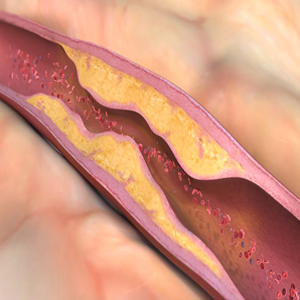High Levels of LDL Cholesterol are Linked to Atherosclerosis

Cholesterol is a fatty substance that our bodies need to function. You need cholesterol to form cell membranes, many hormones and bile acids (which digest fat). But too much cholesterol can hurt you. When there's too much cholesterol in your blood, it can build up on the inside walls of your arteries and increase your risk of heart disease and stroke.
There are two main types of cholesterol: low-density lipoprotein (LDL) cholesterol (the "bad" cholesterol) and high-density lipoprotein (HDL) cholesterol (the "good" cholesterol).
A low LDL cholesterol level is considered good for your heart health. High levels of LDL cholesterol are linked to atherosclerosis.
Atherosclerosis is the hardening of the arteries. It occurs when fat, cholesterol, and other substances build up in the walls of arteries and form hard structures called plaques.
Atherosclerosis affecting the heart is called coronary artery disease, and it can cause a heart attack. When atherosclerosis blocks arteries that supply blood to the brain, it can cause a stroke.
A high LDL cholesterol level and diabetes, risk factors for coronary artery disease include:
♦ Being a male older than 45
♦ Being a female older than 55
♦ Being a female with premature menopause
♦ Having a family history of premature coronary artery disease (a father or brother younger than 55 with coronary artery disease or a mother or sister younger than 65 with coronary artery disease)
♦ Smoking cigarettes
♦ Having high blood pressure
♦ Not having enough good cholesterol (high density lipoprotein or HDL)
You may help to prevent high cholesterol by staying on a healthy diet and exercising daily. A diet high in saturated and trans fats raises LDL cholesterol. Avoid high-fat foods (eggs, fatty red meats, palm or coconut oil, dairy products made with whole milk). Instead eat more fresh fruits and vegetables, whole-grain breads and cereals, and low-fat dairy products.
Cholesterol levels should be measured at least once every five years in everyone over age 20. The screening test that is usually performed is a blood test called a lipid profile. Experts recommend that men ages 35 and older and women ages 45 and older be more frequently screened for lipid disorders.
- Attorney General Approves the Use of Stun Guns as Alternative to Deadly Force
- Judge William J. Martini accused of bias in favor of the City of Englewood in Civil Lawsuit for False Imprisonment
- City of Englewood sued for over 76 million in false arrest civil lawsuit
- Detective Marc McDonald of Englewood Police Department named in Federal Lawsuit for allegedly falsifying evidence and testimony
- Federal Judge William J. Martini DENIES Plaintiff Marc Stephens second motion for reconsideration in $76 Million civil lawsuit for false arrest
- President Obama Nominates Eight to Serve on United States District Courts
- Marc Stephens Files Notice of Appeal With The United States Court Of Appeals For The 3rd Circuit Regarding Suit Against City Of Englewood
- Marc Stephens Files Motion to Recuse Federal Judge William J. Martini of the U.S. District Court
- Kim Kardashian mentioned in $76 million civil lawsuit against City of Englewood, Englewood Police Department, and Two Lawyers
- Borghi Fine Art Gallery sues City of Englewood for ban on displaying of nude paintings
- Marc Stephens to Appear in Front of Fort Lee Judge Matthew Fierro Regarding Right to Travel
- The City of Englewood pays $125K settlement after shooting victim Edward Smalls of Jersey City
- Judge John R Desheplo to rule on Marc Stephens’ motion regarding the Right to Travel
- Marc Stephens awaiting Judge Julia I. Rodriguez's opinion from the Bronx Supreme Court in $20 million civil lawsuit
- Larry Doby Nominated for Congressional Gold Medal in Pascrell, Renacci Bill
- U.S. Congressman Bill Pascrell, Jr. Addresses Abuses in Visa Programs
- Congressman Donald M. Payne, Jr. Holds Sit-In to Demand Congress Act on Gun Safety Legislation
- Members of New Jersey Congressional Delegation Call for Increased Security Funding to Guard Against Cyber Threats, Increase Port Security
- Rep. Payne, Jr. Remarks During Democratic Caucus Floor Action on Gun Violence
- U.S. Court of Appeals for the 3rd Circuit grants Jurisdiction to Marc Stephens’ appeal against the City of Englewood and Englewood Police Department
- NAACP Statement on the 51st Anniversary of the Voting Rights Act of 1965
- Verismo Opera Receives Grant Award From Bergen County Division of Cultural & Historic Affairs
- President Obama Signs Louisiana Disaster Declaration
- Sustainable Jersey announces new grants funded by the Gardinier Environmental Fund
- Indictments Allege Doctor and 7 Others Operated Ring That Illegally Distributed Tens of Thousands of Pills of Addictive Opiate Oxycodone
- White House Announces New Commitments to the Fair Chance Business Pledge
- Northern NJ Community Foundation Announces Center for Food Action Receives Andrea Tilbian Halejian Memorial Fund's Grant
- Marc Stephens’ petition to the United States Supreme Court reveals that African Americans are STILL SLAVES
- Amicus Curiae Briefs needed in Second Amendment Firearm Case Stephens vs Jerejian
- New Jersey Firearm Permit and Licensing Laws Are Facially Unconstitutional
- Rep. Pascrell Announces $300 Million to Support Veterans' Families
- NAACP Statement on the 53rd Anniversary of the March on Washington
- NAACP Statement on Houston Protest by White Supremacists
- Northern NJ Community Foundation Awards Grant to Fund for Armenian Relief
- Marc Stephens submits opening brief in $76M false imprisonment lawsuit against City of Englewood and Englewood Police Department
- Tyrone Stephens Framed by Detectives from Englewood Police Department (Video)
- Rep. Pascrell Amendment Passes, Excluding Millionaires from Olympic Tax Break
- Rep. Pascrell Announces $2 Million for Community College STEM Programs
- Rep. Pascrell Introduces Border Tax Bill to Boost U.S. Businesses
- The Alementary Brewing Company to Provide Craft Beers at Celebrate Fall With Oktoberfest at The Community Chest
- Networking Group to Sponsor Community Night at Blue Moon
- Rep. Norcross Announces Historic Designation of South Jersey Home Linked to Dr. Martin Luther King, Jr.
- Northern NJ Community Foundation Celebrates Community Foundation Week and Helps Homeless Families
- Bill to Protect First Responders from Anthrax Exposure Passes Senate
- Nat Sherman Cigars and Cigarettes Moves Corporate Headquarters Back To Hometown Of Englewood, N.J.
- Help The Community Chest Provide Some Holiday Cheer to Those Less Fortunate This Season
- Marc Stephens submits Reply Brief in $76M lawsuit against City of Englewood and Englewood Police Department
- Judges can be sued in their individual or official capacities
- The United States Constitution is the supreme law of the land
- New Jersey’s permit and licensing laws are unconstitutional and should be reviewed under Strict-Scrutiny
- New Jersey Legislature passed their firearm laws based on racism and discrimination
- New Jersey's legislature historical background suggests intent to deprive African Americans from the right to keep and bear arms
- Citizens do not need to obtain a permit or license to carry firearms at home and in public
- The State of New Jersey can not ban arms, firearms, ammunition
- The State Cannot Interfere With The Right of The Citizen To Keep And Bear Arms
- The Right to Keep And Bear Arms Is A Guaranteed And Fundamental Right
- Citizens Do Not Need A Permit or License To Exercise Guaranteed And Fundamental Constitutional Rights
- The Individual Fundamental And Inalienable Right To Bear Arms For The Purpose Of Self-Defense Extends Beyond The Home
- Many US States amended their laws prohibiting Blacks from Gun Ownership
- Citizen’s Have the Right To Keep And Bear Arms Of Any Description
- The Community Chest Welcomes New Trustees to Board of Managers
- Marc Stephens Petition For Writ Of Certiorari Received and Docketed By The United States Supreme Court
- Second Amendment Case Titled Marc Stephens v Jerejian Docketed With The United States Supreme Court
- Marc Stephens Reply Brief in $76M lawsuit against City of Englewood Removed from the Record by 3rd Circuit Judges
- Marc Stephens files a Motion for Reconsideration En Banc in $76M lawsuit against City of Englewood
- The Community Chest to Begin New Year with Volunteer Management Workshop Presented by Bergen Volunteer Center
- Pascrell Calls for Independent Congressional Investigation of Trump & Russia
- Northern NJ Community Foundation Helping Underresourced Bergen County Residents With Oral Health
- Marc Stephens submits Amended Reply Brief in $76M lawsuit against City of Englewood and Englewood Police Department
- Supreme Court Justices Set to Hold Conference Regarding 2nd Amendment Case Stephens vs Jerejian
- Rep. Pascrell Responds to President Trump Dressing up Religious Discrimination as Policy
- Marc Stephens Wins Case Proving Citizens Do Not Have to Pay Income Taxes
- Marc Stephens Wins Right to Travel Case Proven Citizens are not required to purchase Vehicle Insurance
- The Community Chest Announces 2017 Request for Proposal
- Payne, Jr. Presents Carolyn Thompson-Wallace of Newark with Legacy Achievement Award
- Pascrell Responds to Chairman who Refuses to Request Trump Taxes
- Marc Stephens challenging New Jersey’s Firearm Laws as Unconstitutional After Receiving Death Threats
- Marc Stephens’ Book “Facially Unconstitutional” Receives over 200k Reads
- Corey Booker Urge Agricultural Trading Companies to Help Stop Deforestation in Latin America
- House Committee Passes Payne, Jr.’s Homeland Security for Children Act
- Rep. Pascrell Calls on President Trump to Uphold Ethics Pledge
- Marc Stephens Second Amendment Case Compels Gov. Christie To Revise New Jersey’s Gun Laws
- Pascrell Responds to Markup of Resolution Seeking Trump Tax Returns
- Marc Stephens Petition for Rehearing filed with SCOTUS in Second Amendment case titled ‘Stephens vs Jerejian’
- 3rd Circuit Court of Appeals set to hear $76M case titled Marc Stephens vs City of Englewood
- Pascrell, Gottheimer Announce $128K Grant for Teaneck First Responders
- Rep. Pascrell To Hold Town Hall Meeting in Tenafly
- 3rd Circuit Judge Luis Felipe Restrepo reviewing $76M lawsuit against City of Englewood
- 3rd Circuit Judge Anthony Joseph Scirica reviewing $76M lawsuit against City of Englewood
- 3rd Circuit Judge Dennis Michael Fisher reviewing $76M lawsuit against City of Englewood
- Marc Stephens Open Letter to U.S. Congress and NJ Legislature regarding $76M lawsuit against City of Englewood
- Englewood Students Give Back With The Community Chest
- Booker, Pascrell, Gottheimer Take Action to Help Boost Federal Funding for Economic Development in New Jersey
- 3rd Circuit Court of Appeals ‘Intentionally Sabotaged’ $76M Lawsuit against City of Englewood
- Marc Stephens request 3rd Circuit Court of Appeals for Internal Investigation regarding alleged Tampering and Spoliation of Evidence
- Northern NJ Community Foundation Collected and Donated Art Supplies to Teaneck Creek Conservancy
- Northern NJ Community Foundation Honored With Flat Rock Brook's Trustee Award
- NJ Supreme Court Approves Changes to Pretrial Release Recommendations for Gun Crimes, Repeat Offenders
- NNJCF'S ArtsBergen Selects Englewood Artists for Creative Hackensack’s “Utility ARTBox Project”
- 3rd Circuit Denies Marc Stephens Motion To Investigate Missing Evidence
- Marc Stephens Request 3rd Circuit Judges To Clarify Their Opinion In $76M Case Against City Of Englewood
- New Jersey Association of Verismo Opera’s 2017-2018 Season Features Tosca and Turandot
- 3rd Circuit Issues Order To Consider Evidence In $76M Lawsuit Titled Marc Stephens vs City Of Englewood - No. 16-1868
- Republicans Vote to Keep Trump Personal & Business Tax Returns Secret
- Marc Stephens Submits Petition for Rehearing in $76M Lawsuit against City of Englewood
- Create®: First-of-its-kind Marketplace of Health Systems Launches in the New York Tri-State Area
- Explore How Art Transforms an Area at Northern NJ Community Foundation's Connect the Dots
- New Jersey Association of Verismo Opera Announces Cast and Creative Team for Puccini's Tosca
- Teacher Removed From Dwight Morrow High School by Police for Alleged Verbal Abuse of Female Student
- Englewood Law Enforcement Among 1000 L.E.A.D. Certified Instructors to Help Address Onset of Drug Use in New Jersey
- 3rd Circuit Judges Scirica, Restrepo, and Fisher Refuse to Send $76M Lawsuit against City of Englewood to Trial
- Northern NJ Community Foundation Awards Grants for Armenian Genocide Education and Higher Ed Scholarship
- The Community Chest Launches Annual Campaign to Raise $300,000 to Help People in Need
- Northern NJ Community Foundation Celebrates Community Foundation Week
- Marc Stephens starts fundraiser in preparation to filing $76M lawsuit against the City of Englewood with the Supreme Court
- Marc Stephens files Judicial Misconduct Complaint against 3rd Circuit Judges Scirica, Restrepo, and Fisher
- Pascrell, Levin, DeLauro Call on Trump Administration to End Outsourcing
- Marc Stephens’ Extension to File a Petition for Writ of Certiorari is Granted by Supreme Court Justice Alito
- Englewood Model Danielle Chaney Found Dead in Houston Texas Apartment
- Pascrell Statement on Report that Trump Wants to Kill Gateway Tunnel Project
- Marc Stephens Files a Petition for Writ of Certiorari with the Supreme Court of the United States
- Pascrell Responds to South Korea Trade Deal
- Division of Elections Reminds Registered Voters of Upcoming April 11 Deadline for Change of Party Affiliation
- Marc Stephens Files FBI Complaint Regarding the Murder of Englewood Model Danielle Chaney
- ShopRite Expands Free Fruit For Kids Program
- Pascrell Pushes Carson on Fair Housing Discrimination Enforcement
- Chief Judge of United States Court of Appeals for the Third Circuit denies Stephens’ Judicial Misconduct Complaint
- Bergen County Students Receive Top Recognition on National Language Exams
- Memorial Day Ceremony and Parade at Soldiers Monument
- Heavyweight Champ Jack Johnson Pardoned after 105 years by President Donald Trump
- Marc Stephens files Petition for Review Regarding Misconduct by 3rd Circuit Judges Scirica, Restrepo, Fisher and Martini
- ShopRite of Englewood Remodel Enhances In-Store Experience
- $76M Lawsuit: Marc Stephens vs City of Englewood Docketed with the Supreme Court of the United States
- Marc Stephens Petition for Writ of Certiorari Denied by the Supreme Court of the United States
- Pascrell, Gottheimer Announce $2.2M School Safety Grants
- Marc Stephens Files a ‘Petition for Writ of Mandamus’ in $76 Million Lawsuit Against City of Englewood
- Booker Podcast Celebrates African-American Music with Questlove
- Pascrell Leads 59 Colleagues Demanding Release of Imprisoned Mexican Labor Lawyer
- Norcross, Stefanik Introduce Bipartisan Military Spouse Student Loan Deferment Act
- Former Harlem Kingpin Sends Cease and Desist Copyright Infringement Notice to Comedian Kevin Hart
- Federal Judge rules in favor of Marc Stephens in $6 Million case against the City of Englewood and Englewood Police Department
- Marc Stephens Entertaining Settlement in $6 Million Illegal Search case against the City of Englewood and Englewood Police Department
- Booker, Durbin, Armstrong, Jeffries Announce Re-Introduction of Bipartisan Legislation to Eliminate Federal Crack and Powder Cocaine Sentencing Disparity
- Rep. Norcross Announces Over $1.4 Million for Rutgers–Camden Community Partnership Centers
- Pascrell, Peters, House Colleagues Demand Continued Test Coverage for Medicare Beneficiaries
- Gottheimer Helps Make Sushi at New, Locally-Owned Small Business Shumi Japanese Cuisine in Leonia
- Federal Judge Rules in Favor of Marc Stephens in $4.5 Million case against Experian, Equifax, Synchrony Bank, and PayPal
- Pascrell Marks One Year Since Russia’s Illegal Invasion of Ukraine
- Pascrell Co-Led Resolution Supporting Aid for Türkiye and Syria Passes House
- Federal Judge Rules in Favor of Marc Stephens in $20 Million Lawsuit against Stockton University, Robert Blaskiewicz Jr., Det. Michael Matteoli, Atlantic County Prosecutors, and Attorney General
- Booker Introduces Legislation to Facilitate U.S. Government Pet Transportation Overseas
- Pascrell Continues Fight for More Funding for Firefighters with Cancer
- Rep. Watson Coleman Introduces Resolution Recognizing the Importance of Intersectionality for Abortion Access
Video of the Day
- Detective Marc McDonald of Englewood Police Department accused of fabricating evidence to a grand jury
- Detective Nathaniel Kinlaw of Englewood Police Department accused of fabricating police report
- Detective Desmond Singh of Englewood Police Department named as defendant in $76 Million dollar civil rights lawsuit
- Detective Nathaniel Kinlaw of Englewood Police Department named as defendant in $76 Million dollar civil rights lawsuit
- Detective Claudia Cubillos of Englewood Police Department named as defendant in $76 Million dollar civil rights lawsuit
- Detective Santiago Incle Jr of Englewood Police Department named as defendant in $76 Million dollar civil rights lawsuit
- City of Englewood named as defendant in $76 Million dollar civil rights lawsuit
- Englewood NJ Detective gives false testimony in Superior court
- Englewood NJ Detective Fabricate Evidence Against Juvenile
- Englewood NJ Detective fabricate police reports to make a false arrest of a juvenile

